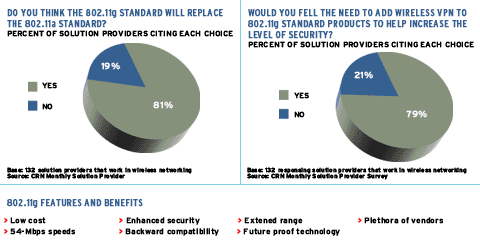802.11g Promises Higher Profits From Wireless
CRN believes that 802.11g makes the most sense for all but a few wireless implementations. With the recent ratification of the 802.11g standard by the IEEE and continuing price declines, solution providers need look no further than 802.11g to meet most any of their customers' wireless infrastructure needs.
How come? In the first place, 802.11g offers significant advantages in both speed and security over 802.11b, while still providing backward compatibility with that older technology. The 802.11g standard offers speeds as high as 54 Mbits per second, a fivefold increase over 802.11b's 11 Mbits-per-second throughput.

On the security side, most 802.11g solutions have adopted Wi-Fi Protected Access (WPA) as the primary means of securing wireless traffic. WPA offers significant resistance to interception and decryption of wireless traffic through WPA's use of a temporal key, which eradicates eavesdropping technologies. In contrast, older security technologies, such as Wired Equivalency Protocol (WEP), have been found to be quite susceptible to eavesdropping and cracking attacks.
Most wireless solution providers surveyed by CRN said WPA represents a significant advance in solving the wireless security problem,but not a complete solution to the problem. Nearly four out of five wireless VARs surveyed nonetheless think it is wise to add wireless VPN to 802.11g products to enhance security. This is a perfect example of new and existing technologies combining to improve customer solutions while yielding fatter profits.
Solution providers looking to speed up wireless connections will still to choose between 802.11g or 802.11a.
While 802.11a offers better resistance to interference and higher real-world throughput, solution providers may still find 802.11g a better choice for most installations. The key lies with 802.11g being backward-compatible with 802.11b-based equipment. In contrast, 802.11a operates on a 5GHz spectrum that precludes compatibility with 2.4GHz-based solutions such as 802.11b and 802.11g. While use of the higher 5GHz spectrum by 802.11a helps to avoid RF interference and boost speed, it also has reduced range and increased costs compared with 802.11g.
Results of the CRN Monthly Solution Provider Survey show that in a two-way contest, 802.11g wins hands down over 802.11a, with 81 percent of respondents stating that the 802.11g standard will eventually replace 802.11a entirely.
